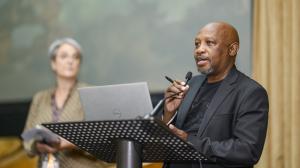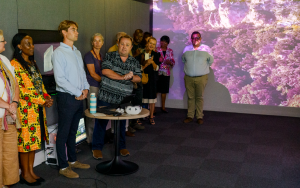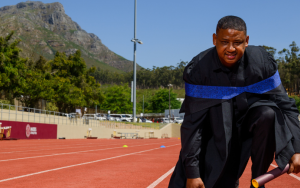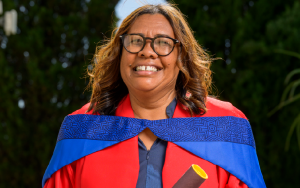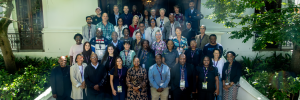
SU helps facilitate entrepreneurial innovation with high impact workshop
- SU and CPUT co-host a high-level workshop on building entrepreneurial universities in the SADC region.
- The four-day Erasmus+ initiative unites academia, industry and government to co-create innovation-driven curricula.
- SU leaders emphasise entrepreneurship as key to tackling youth unemployment and driving Africa’s transformation.
At a gathering of higher education leaders from across the Southern African Development Community (SADC), Stellenbosch University (SU) reaffirmed its commitment to transforming the higher education landscape through entrepreneurship and innovation.
The training workshop held this week at Lanzerac Wine Estate and co-hosted with the Cape Peninsula University of Technology (CPUT) under the University-Industry Co-Creation (UNIICo-create) project, forms part of an Erasmus+ initiative of the European Union. It aims to strengthen partnerships between academia, industry, and government to foster a new generation of entrepreneurial universities in the region.
Welcoming delegates to the opening session, Prof Sibusiso Moyo, SU’s Deputy Vice-Chancellor: Research, Innovation and Postgraduate Studies, said universities must take the lead in shaping Africa’s future through innovation. “The UNIICo-create project challenges each one of us to think differently about the purpose of higher education,” she said. “Across the globe, universities are being called to demonstrate not only academic excellence, but also social and economic relevance.”
Moyo noted that the urgency of this transformation is driven by South Africa’s high youth unemployment rate, which stands at more than 60% among 15–24-year-olds. “Our continent is rich with creativity and ideas, yet many of our graduates struggle to find work, not because they lack talent, but because our economies are not creating enough opportunities,” she said. “The solution lies not only in job creation, but in nurturing a generation of job creators.”
Embedding entrepreneurship in the DNA of universities
The workshop brings together representatives from universities, government ministries, and industry across the SADC region to co-design curricula that integrate entrepreneurship and innovation into teaching and institutional culture. Over four days, participants will explore topics including entrepreneurial ecosystems in Africa, teaching for the future, strategies for embedding entrepreneurship and innovation, and support for educators.
The programme also includes sessions on developing entrepreneurial learning outcomes, leveraging digital technologies for innovation, and curriculum co-creation with industry. Study visits to Stellenbosch University’s LaunchLab, a leading startup incubator, and CPUT’s South African Renewable Energy Technology Centre (SARETEC) will showcase how university-industry partnerships translate research into real-world impact.
“Entrepreneurial thinking is not confined to business schools or startup incubators,” Moyo noted. “A historian, a teacher, a scientist or an artist can all be entrepreneurs in how they approach challenges, connect ideas and turn knowledge into impact.” She praised the role of SU’s Faculty of AgriSciences as a model for embedding entrepreneurship into its teaching, linking students to innovation within the agricultural value chain.
Moyo also stressed the importance of partnerships. “Industry collaboration ensures that what we teach aligns with what the world needs, while government involvement helps scale successful models across the system. No university can do this alone,” she said.
Turning knowledge into impact
Delivering the opening address, Prof Deresh Ramjugernath, SU’s Rector and Vice-Chancellor, highlighted the institution’s vision of becoming a truly entrepreneurial and research-intensive university. Drawing on his own background as an entrepreneur and academic innovator, he said universities must go beyond knowledge production to achieve tangible social and economic impact.
“Our work goes wider than training students and generating knowledge,” he said. “It’s about how we take those outputs and translate them into outcomes that address inequality, poverty and unemployment. That is what this workshop and initiative are all about.”
He urged universities to cultivate an entrepreneurial mindset among both students and staff. “Not all graduates will start companies, but they must all learn to think creatively, act decisively and use their skills to add value. That’s the kind of mindset we must embed in our institutions,” he said.
Ramjugernath highlighted SU’s commitment to academic renewal – updating curricula not only in content but also in approach. “We must move from teaching about entrepreneurship to teaching through it,” he said. “That means redesigning curricula, rethinking assessments, and building ecosystems that link learning to real-world challenges.”
He pointed to SU’s strong record in innovation, including one of the highest numbers of patent filings and spin-off companies. “Over the past decade, we’ve launched 44 spin-off companies. Our goal now is to see 300 student startups each year, particularly from undergraduates. That’s how we turn ideas into impact.”
Ramjugernath stressed that co-creation is key to this transformation. “It’s about shared ownership of ideas and outcomes among universities, industry, government, and communities. When universities nurture innovative thinkers and problem-solvers, they strengthen society as a whole.”
Building the universities of the future
As the workshop continues through the week, participants will reflect on best practices and develop actionable strategies to drive entrepreneurship education across the SADC region.
Dr Erna Blancquaert, principal investigator of the UNIICo-create project at SU, said the initiative offers powerful spaces for new partnerships that can lead to real-world impact. “We want participants to leave inspired with fresh perspectives, practical tools and a renewed sense of how to co-create curricula on entrepreneurship and innovations in the SADC region,” Blancquaert added.
Delegates emphasised that entrepreneurship education has become even more critical in the age of artificial intelligence (AI). Universities need to equip graduates with the creativity, adaptability and problem-solving skills needed to thrive in a rapidly changing world of work.
Ramjugernath concluded by saying he hopes the workshop will inspire new ways of thinking about how our institutions can lead Africa’s transformation by cultivating graduates who are not only employable, but who will help shape the economies of tomorrow for Africa. “Academic excellence is a given,” he declared. “The real question is how we translate that excellence in service of society.”
- More information here: https://uniico-create.org/




